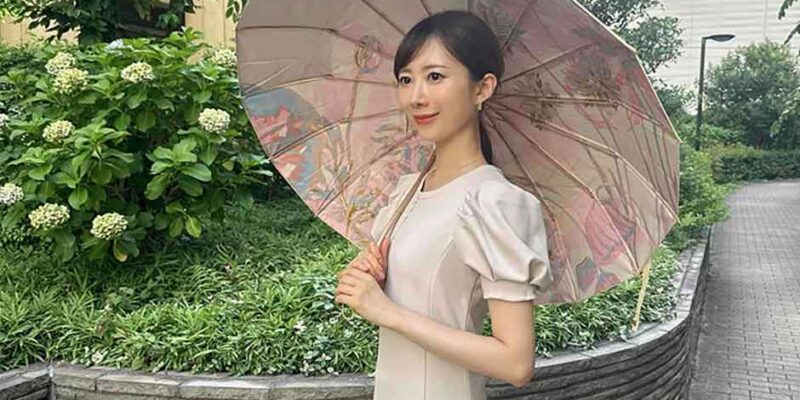When most people think about life in Japan, images of neon-lit streets, cherry blossoms, and bustling train stations often come to mind. But anyone who has lived in or even visited Japan knows there’s another everyday icon that quietly shapes daily routines: the folding umbrella. Unlike 長傘, folding versions have become indispensable across Japanese society. They are not only practical during sudden showers but also reflect deeper cultural values of preparedness, convenience, and social etiquette.
This article explores why folding umbrellas are more than just a rainy-day accessory in Japan—and why they’ve become essential for locals and visitors alike.
A Country Where Weather Can Change in Minutes
Japan’s climate plays a huge role in the popularity of folding umbrellas. Summers are marked by sudden downpours during the rainy season (tsuyu), while autumn and spring bring unpredictable showers. In major cities like Tokyo, Osaka, and Fukuoka, it’s not unusual for the weather forecast to shift dramatically within hours.
Carrying a full-sized umbrella every day would be inconvenient. That’s where the folding umbrella steps in. Its compact size means it fits easily into handbags, backpacks, or even the inside pocket of a business suit. For a country where commuting by train is the norm and people spend much of their day outside, this flexibility makes a world of difference.
Convenience Meets Urban Lifestyle
Japanese urban life is defined by movement—walking to the station, transferring between trains, shopping in compact malls, or dining in small cafes. A long umbrella can be awkward in these crowded spaces. Many train stations even have umbrella stands or lockers because of the sheer volume of umbrellas people carry.
A 折りたたみ 傘 eliminates much of this hassle. It can be collapsed and stowed away quickly, avoiding wet drips on crowded platforms or cramped elevators. This aligns with Japan’s social emphasis on not inconveniencing others—a principle that quietly drives many daily habits.
An Accessory That Reflects Social Etiquette
In Japan, consideration for others is a cornerstone of social interaction. A soaking wet full-sized umbrella left on a shop floor or train can be seen as impolite. Folding umbrellas, on the other hand, minimize the mess. They often come with protective covers, allowing people to carry them into stores or restaurants without leaving puddles behind.
This small detail is not just about convenience—it reflects broader cultural values. By carrying a folding umbrella, individuals subtly signal attentiveness and respect for shared spaces, reinforcing the harmony that underpins Japanese society.
The Role of Folding Umbrellas in Business Life
Business culture in Japan is famously formal and detail-oriented. Arriving at a meeting with soaked clothes or dripping water in an office lobby can leave a negative impression. Folding umbrellas provide professionals with a discreet tool to stay polished despite sudden rain.
Their compactness also means they can be easily stored in briefcases. Many Japanese department stores and convenience stores sell sleek, minimalist folding umbrellas designed specifically for office workers—usually in neutral colors like black, navy, or gray. In this way, the folding umbrella becomes part of the professional toolkit, alongside business cards and polished shoes.
Stylish and Functional: A Fashionable Everyday Item
In recent years, folding umbrellas in Japan have gone beyond utility and entered the realm of fashion. From minimalist designs that match office attire to vibrant patterns that brighten a gloomy day, there’s a folding umbrella for every personality. Some are even UV-coated, making them a dual-purpose accessory for both rain and sun protection.
For younger generations, folding umbrellas are often chosen as much for their aesthetic appeal as for their practicality. This has made them a common gift item, reflecting both thoughtfulness and practicality—a combination deeply valued in Japanese gift-giving culture.
Technology and Innovation in Folding Umbrellas
Japan is known for technological innovation, and even everyday items like folding umbrellas benefit from this reputation. Many modern designs incorporate lightweight but durable materials, wind-resistant structures, and quick-dry fabrics. Some even feature automatic open-and-close buttons, which are especially useful when rushing between trains or stepping out of taxis.
These small advancements turn what might seem like a simple accessory into a piece of clever engineering that meets the demands of fast-paced Japanese life.
Eco-Friendly and Space-Saving Considerations
In Japan’s urban environment, where space is limited and environmental consciousness is growing, folding umbrellas make sense from both perspectives. They take up less storage space in small apartments and are more likely to be carried around, reducing the number of “disposable umbrellas” purchased during sudden rain showers.
Japan has a notorious problem with cheap plastic umbrellas—millions are discarded each year after only a few uses. Folding umbrellas, which are more durable and reusable, help reduce this waste. For eco-conscious consumers, choosing a folding umbrella is not only convenient but also a small step toward sustainability.
Everyday Scenarios Where Folding Umbrellas Shine
Commuting: Easy to tuck away in a bag, ensuring you’re always prepared for sudden showers.
Shopping: Compact design makes it simple to carry through crowded stores without bumping into others.
Dining Out: Covers prevent dripping, so you can bring it into restaurants politely.
Travel: Lightweight and portable, making them ideal for domestic trips or vacations abroad.
Family Life: Parents often keep a folding umbrella in their child’s school bag for unexpected weather changes.
These scenarios highlight why folding umbrellas aren’t a niche accessory but a mainstream necessity across Japanese society.
Why Visitors to Japan Should Also Carry One
Tourists exploring Japan’s cities and countryside will quickly understand the value of folding umbrellas. They save travelers from last-minute purchases of cheap plastic umbrellas and ensure comfort while sightseeing. Having one tucked away also means being prepared for sudden rain during hanami picnics, temple visits, or summer festivals.
Many travelers even bring their folding umbrellas back home, recognizing that this small Japanese habit is universally useful.
Conclusion: A Small Item with a Big Impact
The folding umbrella may seem like a modest tool, but in Japan, it has become a cultural staple that reflects the nation’s values of preparedness, convenience, and respect for others. Its compact size, stylish versatility, and eco-friendly benefits make it far more than just rain protection.
Whether you are a busy commuter, a parent, a professional, or a visitor, carrying a folding umbrella ensures you are ready for the unexpected—without burdening yourself or those around you. In many ways, this humble accessory encapsulates the balance of practicality and mindfulness that defines everyday life in Japan.

















